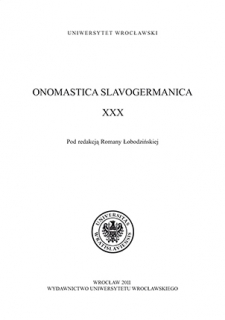Słowiańskie imiona osobowe — "voces magicae"?
Słowa kluczowe:
historyczna antroponimia słowiańska, magiczne funkcje imion osobowychAbstrakt
Slavic personal names — words of power?
The article constitutes an attempt to present the traditional Slavic personal names as a product and an integral element of the local oral pre-Christian culture. It is commonly known that syntheticity was a distinguishing feature of all pre-modern civilizations including the old Slavic one.
The base of the archaic Slavic philosophy of life was the dichotomous separation of the zone taken into possesion by people “this world” from the nonhuman extraneous one “the other world” which had numerous semiotic and symbolic representations. The symbolic crossing of the border between these two parts of the Universe — the ecumene tame, inhabitated, known territory and the anecumene wild, dangerous, mysterious external areas — was possible by means of rites de passage i.e. the rituals that marked the passage of a person through the life cycle, from one stage to another over time, from one role or social position to another as well as verbal magic.
Thinking and talking were considered by illiterate peoples as actions in which energy was expended. According to their primitive beliefs, words were devoid of the material form. They seemed to have power over the named objects. The purpose of using magic words was mediating between spaces mentioned above and achieving the expected results in everyday life. Communication with the other world was possible by performing special verbal rituals. Each word uttered during a ritual, including a personal name, was a word of special importance and magic significance.
In primitive cultures the bond between people and their names was real, not imaginary. Our ancestors believed that a personal name made a part of his owner, coexisted with him and determined his fate. Magic procedures in relation to a man could be fulfilled by means of his name as easily as by means of any other material part of his body. As a consequence of this conviction, the real names were kept secret. The practice of tabooing the real names and using the alternative ones instead seems to have a long-standing tradition not only among the old Indo-European tribes. It is quite possible that it survived and was followed in medieval Slavic societies. The arguments for that are presented in this article.
It seems highly likely that the future events of the owner’s life were projected by means of his personal name. Intentions and wishings contained in a metaphorical one-part name or in a specially formed name-incanation were crucial for success of ritual mediative actions between man and Nature. What is more they could probably also exert an influence on people’s behaviour on the subconscious level indirectly determining their bearers’ deeds. Slavic compound personal names were conspicuous by unique poetical characteristics — obscureness and inexplicability. Their hermetic and esoteric formulas might be considered to be a vehicle for magical and sacral values. It should be emphasized that there were many types of compound personal names that had no morphological equivalents among the models of compound common nouns. Thus it is evident that Slavic compound personal names might have been created, especially in the beginning, by accomplishing the real act of ritual composition.

